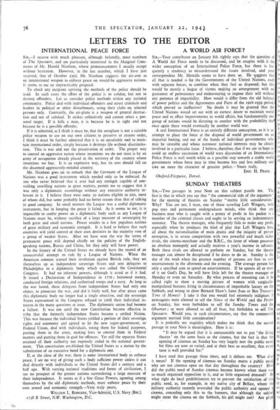INTERNATIONAL PEACE FORCE
LETTERS TO THE EDITOR
receive with much pleasure, although belatedly, most numbers of The Spectator, and am particularly interested in the Marginal Com- ments of Mr. Harold Nicolson, whose pronouncements I usually accept without hesitation. However, in the last number, which I have just received, that of October 23rd, Mr. Nicolson suggests the air-arm as an international weapon to enforce peace on would-be aggressive nations. It seems to me an impracticable proposal.
To check any incipient uprising the methods of the police should be used. In such cases the effort of the police is to subdue, but not to destroy offenders. Let us consider police methods within any national community. Police deal with individual offenders and arrest criminals and leaders in political or other disturbances, using their clubs on selected persons only. Contrarily, the air-plane is a weapon of general destruc- tion and not of subdual. it strikes collectively and cannot select a per- sonal target. If it kills a man, it is because he is in sight and not because he is a possible offender.
If it is admitted, as I think it must be, that the aeroplane is not a suitable police weapon to use on our own citizens to preserve or restore order, 1 think it must be further admitted that it is an unsuitable tool to main- tain international order, simply because it destroys life without discrimina- tion. This is war and not the preservation of order. The proper way to control an aggressive nation whose intentions we do not trust is by an army of occupation already placed in the territory of the country whose intentions we fear. It is an expensive way, but its cost should fall on the disarmed aggressively-minded country.
Mr. Nicolson goes on to remark that the Covenant of the League of Nations was a good instrument which needed only to be enforced. As one who never believed that it ever had any strength capable of con- trolling unwilling nations in great matters, permit me to suggest that it was only a diplomatic assemblage without any executive authority in- herent in it. I believe there were some 5o nations eligible to join, most of whom did, but some probably had no better reason than that of talking in good company. In small matters the League was a useful diplomatic instrument, but in keeping the peace it failed. As it seems to me, it is impossible to confer power on a diplomatic body such as any League of Nations must be, without sacrifice of a large measure of sovereignty, by both great and small nations. Power resides in a few populous nations of great military and economic strength. It is hard to believe that such countries will yield control of their own destinies to the majority vote of a group of weaker States. After we have won the war the terms of permanent peace will depend chiefly on the policies of the English- speaking nations, kussia and China, for they only will have power. In the history of the United States we already have the record of an unsuccessful attempt to rule by a League of Nations. When the American colonies started their revolution against British rule, they set themselves up as independent sovereign States and sent delegates to Philadelphia to a diplomatic body which was called, the Continental Congress. It had no inherent powers, although it acted as if it had. It issued a Declaration of Independence in 1776 ; borrowed money, conducted foreign relations, and authorised troops and a navy. As long as the war lasted, these delegates from independent States had only one object, to prosecute the war, and did it fairly well, but after peace came this diplomatic body no longer had a single objective, and the sovereign States represented in the Congress refused to yield their individual in- terests in the many questions at issue. The diplomatic union had become a failure. It was not until the new Constitution became effective in 1789 that the formerly independent States became a unified Nation. This was because the individual States yielded a portion of their sovereign rights and autonomy and agreed to let the new super-government, or Federal Union, deal with individuals, taxing them for federal purposes, putting them in the army, making laws to control them in Federal matters and putting them in gaol for offences. Yet still the separate States retained all their authority not expressly ceded to the national govern- ment. This constitution established the United States as a nation by the substitution of an executive bond for a diplomatic one.
If, at the close of the war, there is some international body to enforce peace, I sec no way of giving such a body sufficient power unless it can deal directly with individuals as the United States did a century and a half ago. With varying national traditions and forms of civilisation, I see no prospect of the greater nations surrendering a large measure of their independence. It seems as if a few Great Powers, agreeing among themselves by the old diplomatic methods, must enforce peace by their own armed and economic strength.—Very truly yours,


























 Previous page
Previous page